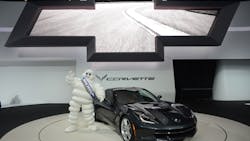For the past 30 years, Pete Selleck, has worked for Michelin (IW 1000/160), serving as plant manager and COO of Michelin Americas Small Tire operations, among other roles.
Now, as chairman and president of Michelin North America Inc., he oversees the operations of the company’s 18 facilities in the U.S.
After delivering a keynote address “The Michelin Manufacturing Way” at IndustryWeek’s 2013 Best Plants conference in Greenville, S.C., Selleck took time to share his thoughts on leadership with IW.
How does your West Point training impact your leadership style?
Quite a bit. West Point is probably, some people say, it’s the best leadership school in the world. Having had that experience and also having had the experience as a leader in the military, in the manufacturing environment, there’s a lot of carryover.
Obviously, it’s not exactly the same; there are many differences. But standing in front of people and leading them in a certain direction, it’s a very, very difficult skill and by getting a lot of practice, as you do in the military, that helps you as you move into an industrial environment.
Most people learn leadership from trial and error. You go in front of a team, you do things, you see what works, you see what doesn’t work and then you make adjustments. The only way you can do that is to have experience, have practice at doing it.
How would you describe your leadership strategy?
I would say, first of all, it’s values based. You have to understand the values and also the culture of the organization you’re in and adapt your style to knowing how the company really does operate. The issue of culture and values is very, very important.
How does your style fit in with Michelin’s culture?
Well, it just happens that Michelin has hired a lot of people with similar backgrounds to mine. We also hire people with other backgrounds, but people coming into the company with military experience have tended to do well, not just in the United States but in other parts of the world as well.
Leadership Advice
What leadership advice would you give to a new CEO or someone struggling to be in that role?
I think the key, the first thing, is humility. Leaders make mistakes every day. You have to be able to have people tell you, not be afraid to tell you, when you’re making mistakes, be able to accept their feedback and not shoot the messenger when they do it and then make adjustments.
Is there any one person who’s really impacted you as a leader?
I think so. When I was in the Army, when I was a company commander in the Army, the guy who wrote my appraisal was a lean one star general named Colin Powell, so I actually got to work with General Powell when I was very young.
In the military, you get to work with a lot of people like that. It’s not that unusual. I saw him perform in a rather difficult situation in his career and I watched his leadership style during that period. I use him as an example when I think, 'how would General Powell deal with something like this?'
Bonus question: What do you see as the next changes coming in your industry? Where do you see your industry going in the next 10 to 20 years?
Innovation is clearly the hallmark. We have to figure out what are the next innovations in products and services. We’re certainly going to have incubators and other innovation projects that are ongoing.
We’re across anything involving mobility. I think clearly urban mobility is going to become one of the increasing issues. There are more and more people are in the cities and noise and fuel economy requirements inside cities are going to get tighter and tighter.
Check out IW's complete "Take 5" series, a regular section featuring interviews with top executives.
About the Author
Ginger Christ
Ginger Christ, Associate Editor
Ginger Christ is a former associate editor for EHS Today, a Penton publication.
She has covered business news for the past seven years, working at daily and weekly newspapers and magazines in Ohio, including the Dayton Business Journal and Crain's Cleveland Business.
Most recently, she covered transportation and leadership for IndustryWeek, a sister publication to EHS Today.
She holds a bachelor of arts in English and in Film Studies from the University of Pittsburgh.
